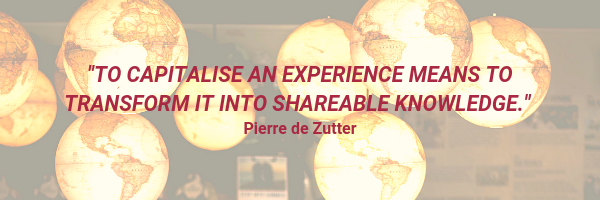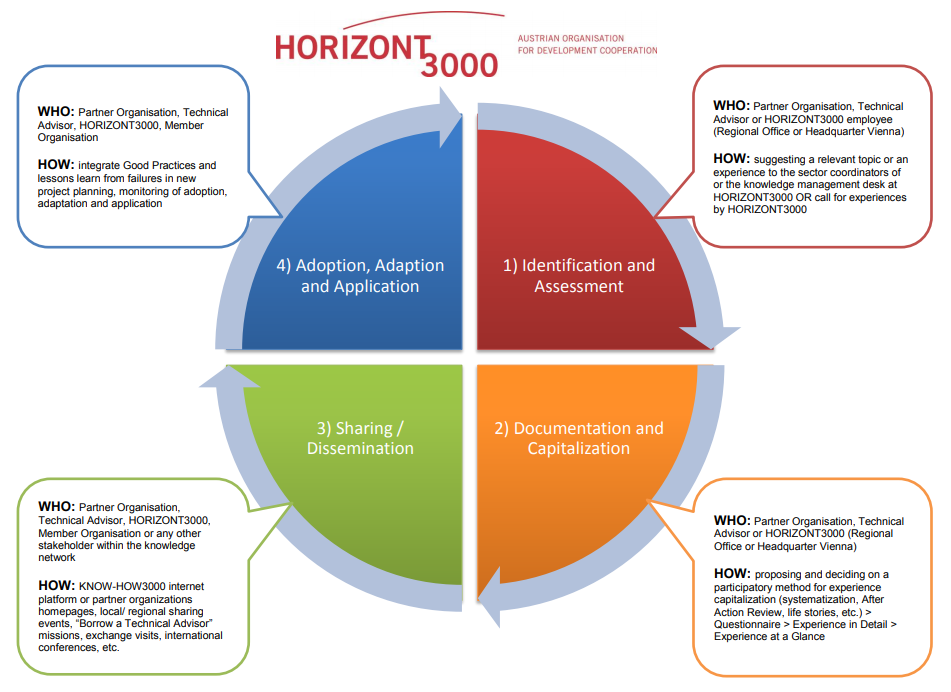Make Your Experiences Count. They Can Change the World.
LET’S BRING ALL OF OUR KNOWLEDGE AND EXPERIENCES TOGETHER.
TOGETHER WE KNOW MORE. TOGETHER WE ACHIEVE MORE. TOGETHER WE DO BETTER.
LET’S BRING ALL OF OUR KNOWLEDGE AND EXPERIENCES TOGETHER.
TOGETHER WE KNOW MORE. TOGETHER WE ACHIEVE MORE. TOGETHER WE DO BETTER.

KNOW-HOW3000 is HORIZONT3000’s Knowledge Management programme. It aims to provide the tools for its partner organisations, employees and Member Organisations that facilitate learning from
their own and other relevant experiences in order to increase the effectiveness and impact of their own work.
Experience is the tacit knowledge that our employees, project teams and organisations gather when doing their work. Experiences are hidden treasures in organisations and are not always explicitly shared within teams and with others.
By systematically reflecting on their experiences, learning from their positive and negative practice as well as by getting access to other experiences, HORIZONT3000 fosters organisational learning. That way partner organisations are encouraged to adapt their practice and methods and to improve their services for their target groups.
In order to share learnings from experiences, capitalisation and documentation of experiences is helpful. Capitalising experiences means to collectively reconstruct and document what has happened, reflect on it and draw lessons learnt.
HORIZONT3000 tries to promote participatory ways of experience capitalisation, as learning from experience is enriched if more points of views are integrated. Participatory Experience Capitalisation means that representatives of stakeholders involved in an action and/or experience are
involved in the capitalisation process. The method “Systematisation of experiences” is one participatory method that HORIZONT3000 promotes within its KNOW-HOW3000 experience capitalisation process. Further methods are described below.
The following categories are defined and supported within the KNOW-HOW3000 knowledge management system in order to achieve know-how sharing and mutual learning. All the experiences capitalised and shared within KNOW-HOW3000 imply the potential to learn from it – both for the organisation that has made the experience as well as for other organisations working in similar fields.
“Good Practice” refers to a relevant positive experience. Documenting and sharing what has been successful is key to prevent others from reinventing the wheel or committing the same mistake.
“Learning from Failure” refers to a relevant negative experience. HORIZONT3000 believes that failures or negative experiences can teach organisations a lot. Focusing on what has been learnt out of a failure rather than evaluating who has done something wrong implies a huge potential to learn.
In order to capitalise an experience Partner Organisations have to follow 4 steps. Each step might involve different stakeholders and different methods of documentation and dissemination. The experience capitalisation process starts with identifying potential experiences and ends with reintegrating the learnings into the daily work.
The experience is shared via the KNOW-HOW3000 Internet Platform, our newsletter, partners’ homepages, regional or international sharing events (conferences, exchange visits, “EoE”, etc.), e-mail, or any other way.

Partner Organisations that want to share their experiences with other organisations within the KNOW-HOW3000 network, can use a participatory method before filling out the Questionnaire for Experience Capitalisation – either for learning from good practice or for learning from failure. The following methods can be helpful in order to capitalise experiences in a participatory way.